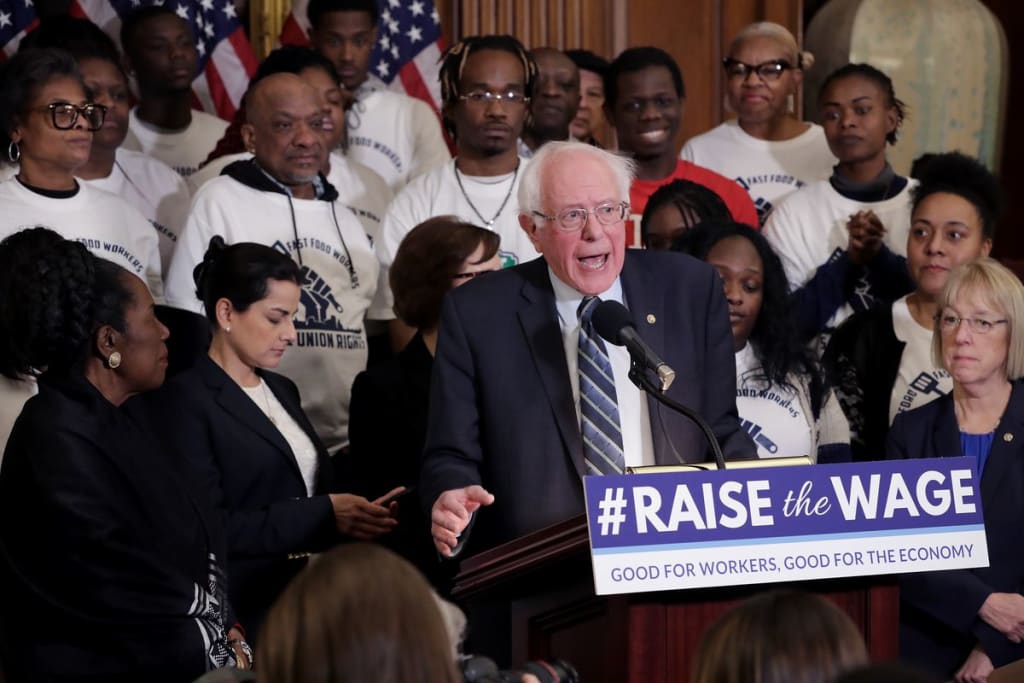3 arguments keyboard economists want you to believe about minimum wage
Find out the answers to the most popular arguments

The minimum wage topic has been one of the most fiercely discussed economic policies all over the world. However, the discussions in the United States seem to be a lot more vocal, including things such as protests, social media posts, every-day activism and various other methods of helping spread the word.
I like to call this specific issue a complete anomaly simply because there is no clear divide between the left and the right. There are many on either side of the political spectrum that has very strong opinions about this matter.
In this article, I’d like to debunk some arguments of politicians and economists that are against raising the minimum wage in an already flourishing economy. The arguments aren’t even relevant if the economy is not flourishing.
Employers would have to reduce hours or fire people
This argument has some merit to it as economists believe that small businesses would not be able to handle labor costs if they are not profitable enough. Having customers remain on the same level and investing more into labor without getting tangible results could weight in on a business’s performance.
Because of this, it’s predicted that employers would have to reduce hours or fire some of their employees.
This would be absolutely redundant. Why? Because reducing hours for employees does not mean that you’re reducing cost, in fact, you’ll be retaining the same costs but make the whole ordeal much worse for you as you’ll have to hire a new person to fill in those hours you just took out of your first employee’s schedule.
This means that if the minimum wage is doubled, no business owner that has a functioning head on their shoulders would consider lowering working hours to their already trained employees. In fact, they should consider increasing it.
Why is this a more accurate prediction? Well, let’s try and approach it with some logic.
You have employee A who gets paid $8/hr and works 6 hours a day. The state then requires you to pay your employees a minimum wage of $15/hr. You decide that in order to reduce costs you’re going to reduce employee A’s working hours to 4. But here’s the hurdle, who’s going to fill in those 2 hours that you just left out? You? At some point, you would have to hire employee B and put him/her on just a 2-hour workday. Don’t forget to factor in the training costs and the mistakes they will make from the very beginning.
Furthermore, it’s not like you can get away with paying employee B $8/hr after the bill is passed. No, you will have to pay exactly $15/hr, meaning that you are not saving any costs and adding more headaches to your daily management tasks.
At that point, we easily conclude that it’s simply best to keep employee A on their original working hours, but with an increased wage.
EVEN IF working hours are reduced to around 4, employees can simply get a second job. The work hours will still be 4 and the only added time spent will be commuting. If structured correctly and flexibly, it could even turn into a great way to work full time while attending college. The only downside is qualifying for insurance, but the increased wages and hopeful amendments to healthcare costs should be enough to normalize life.
Competing would be much harder
This is the argument that employers with victim complex use. Raising the minimum wage at the federal level is going to affect EVERYBODY, not just one business. This means that if your labor costs are increasing, so are your competitors’.
Employers who think that they don’t have what it takes to compensate their employees accordingly because they’ll lose to their competitors, need to look at their business model and marketing strategies, not to cut costs as much as possible.
Furthermore, most minimum wage jobs are provided by large corporations, therefore it’s not like they will become redundant for adding a couple million to their yearly bills and not like they have thousands of other brands they can’t compete with.
It will hurt the economy in the long run
This argument is usually phrased in a way that making large corporations poorer is going to have a seriously damaging effect on the income tax within the United States or any other country.
The counter to this argument is extremely easy. The extra money paid to the employees will either find itself in the hands of another company providing a product or a service or in a savings account which can later help banks lower interest rates.
Sooner or later or in the long run that keyboard economists like to dread, these extra wages will turn into real estate investments, new startups, manufacturing ventures or even as wages for future generations. This is economics 101, it’s not like paying people extra wages deletes that extra money in the economy.
No, it helps the money circulate more often while giving citizens a stronger purchasing power as well. It helps drive consumerism much faster, thus allowing companies to sell more simply because there’s now more extra income that people are ready to spend.
What do you think would happen if wages continue the way they are and prices remained the same? People would spend money only on necessities such as rent, food & drink, transportation, utilities and medicine from time to time. The very little they’d have leftover would go to a savings account and not to a company trying to sell services or an innovative product.
Keeping the status quo would turn a country’s economy into nothing but ultra-rich retail brands and an oversaturated real estate market.
Increasing the minimum wage though would give small, medium and even large companies many more avenues to promote their products simply because their consumer range will increase significantly, thus they’d manage much more sales.
It’s the cycle of the economy as it should be. Selling a product to a customer that has the means to buy it, and then turning that revenue into wages for your employees so they could do the same down the line.
It’s all a part of keeping the economy a well-oiled machine, and I can’t fathom why people believe it’s going to break the economy.
Think that employees don’t deserve to be paid extra? Look at what arguments factories have in countries like China that violate human rights laws every breathing minute.
Don’t support China? Well then accept the minimum wage increase and you’ll see people avoiding cheaper alternatives from abroad and go for quality local products because they’ll finally be able to afford it.






Comments
There are no comments for this story
Be the first to respond and start the conversation.